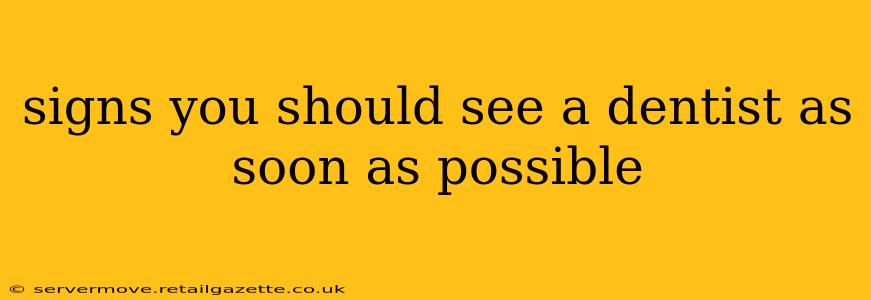Maintaining good oral hygiene is crucial for overall health. However, even with diligent brushing and flossing, dental emergencies and concerning symptoms can arise. Knowing when to see a dentist immediately is vital for preventing further complications and preserving your teeth and gums. This comprehensive guide will outline the key signs indicating you need urgent dental care.
Severe Toothache: When Pain Becomes Unbearable
A persistent, throbbing toothache is a major red flag. While occasional mild tooth sensitivity is common, intense, unrelenting pain usually signals a serious problem, such as a large cavity, an abscessed tooth (infection at the root), or a cracked tooth. Ignoring severe pain can lead to infection spreading to other areas of your face and body, necessitating more extensive (and potentially costly) treatment. Don't wait – contact your dentist immediately.
Swollen Gums or Jaw: Inflammation Signals Trouble
Swelling in your gums or jaw, especially if accompanied by pain, is another urgent sign. This could indicate an infection, possibly an abscess, periodontal disease (gum disease) in an advanced stage, or even a more serious underlying condition. Swelling can also obstruct airways, making immediate attention crucial. Contact your dentist or emergency dental service without delay.
Bleeding Gums: More Than Just Occasional Bleeding
While a little bleeding when brushing or flossing can be normal, persistent or excessive bleeding is concerning. It frequently points to gum disease (gingivitis or periodontitis), a serious condition that, if left untreated, can lead to tooth loss. Recurring bleeding warrants a prompt dental check-up to assess the health of your gums and identify the underlying cause.
Loose or Knocked-Out Tooth: Addressing Dental Trauma
A loose or completely knocked-out tooth requires immediate professional attention. Proper handling and prompt treatment significantly increase the chances of saving the tooth. For a knocked-out tooth, carefully handle it by the crown (the part you normally see) and store it in milk or saliva before heading to the dentist. Time is crucial in these situations, so seek emergency dental care as soon as possible.
Sudden Sensitivity to Hot or Cold: A Signal of Nerve Damage
While some sensitivity is common, a sudden, sharp, and intense reaction to temperature changes can suggest a problem with the tooth's nerve. This could indicate a deep cavity, cracked enamel, or gum recession exposing the tooth's root. Addressing the underlying cause promptly can prevent further damage and potentially save the tooth.
Facial Swelling: Beyond Just Gums and Jaw
Swelling that extends beyond your gums and jaw is a serious warning sign. This could indicate a more significant infection spreading throughout the face or head, necessitating immediate medical and dental intervention. Contact emergency services and your dentist immediately.
Difficulty Chewing or Swallowing: Impacting Daily Function
Persistent difficulty chewing or swallowing could signal an infection, a broken tooth, or an impacted wisdom tooth. These issues can interfere with nutrition and overall well-being, making prompt dental attention crucial.
Open Sores in the Mouth That Don't Heal: Potential for Infection
Mouth sores are relatively common, but those that persist for a long time or become significantly larger and painful require evaluation by a dentist. Chronic sores can be linked to several conditions, including infections or more serious illnesses.
What to Do in a Dental Emergency: Steps to Take
When faced with a dental emergency, remain calm and follow these steps:
- Contact your dentist immediately: Explain your situation and ask for guidance.
- Seek emergency dental care: If your dentist isn't available, locate a nearby emergency dental service.
- Follow any instructions: Your dentist will provide instructions on pain management and temporary care until your appointment.
- Take over-the-counter pain relief: Use ibuprofen or acetaminophen (always follow recommended dosages).
Remember: Your oral health is directly linked to your overall well-being. Don't hesitate to seek urgent dental care when necessary. Early intervention often prevents minor problems from escalating into significant and costly issues. The sooner you address a dental problem, the better the outcome.
